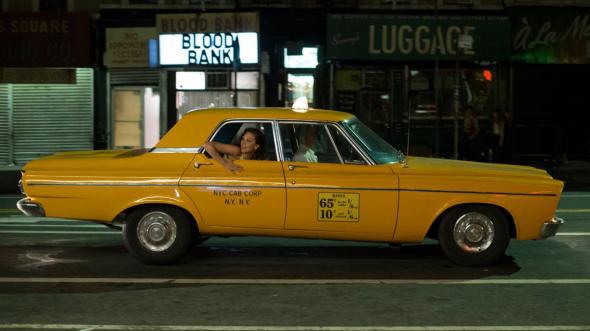“You got me wrong. I love women. But it’s the Deuce.” This was the last spoken line of Sunday night’s first-season finale of David Simon and George Pelecanos’ great, kaleidoscopic The Deuce, about the sex trade in 1970s New York City. As delivered by Vincent Martino (James Franco), the line is a cynical, syntactical echo of “Forget it, Jake, it’s Chinatown,” a sad shrug asking what a good man can do in the depraved, sex-crazed demimonde of 42nd Street. But while Vincent may think of himself as a decent guy with qualms about prostitution, he nonetheless co-owns a mob-financed “massage parlor” and is poised to co-own three more. Step by understandable step, Vincent has become entangled in a corrupt system, so he gives himself a pass—even as he cues up a song, “Careless Love” by Ray Charles, that more honestly describes the way he and everyone else on the show (female characters included) feel about women.
Like all of Simon’s projects, The Deuce is intimately concerned with how people find themselves crushed by, clinging to, or operating the machinery of capitalism. The series provides a panoramic view of all the ways women were exploited at the dawn of the porn age by mobsters, cops, City Hall, pimps, nascent pornographers, sex shops, and themselves. As in The Wire, structural institutions and historical inheritances work with and against each other to create dysfunctional systems so powerful it is nearly impossible to escape them. But there’s a difference between The Wire and The Deuce: Sex can be bought and paid for, but unlike the hard drugs at the center of The Wire it is not only a commodity. Sex can be fun and so can The Deuce, which only lends veracity to the show’s cumulatively damning perspective on the sex trade. If you’ve longed for another Wire, you should watch The Deuce, which is like The Wire’s shaggy, debauched sibling, a show with as many ideas in its head, but fewer answers.
Sunday’s finale contained a sequence with the emotional uplift of a triumphant underdog tale when Candy née Eileen (Maggie Gyllenhaal), a prostitute disillusioned with street life and fascinated by movie-making, finally gets her chance to direct. She has an epiphany that camerawork should be dictated by action, which the guy who was supposed to direct observes is straight from the Hitchcock-Truffaut interviews—or, as she refers to them, Hitchcock and Truffles. As you’re basking in the unexpected high of the moment, of a woman finally getting a chance to show what she can do, and grappling with all the counterintuitive things this scene suggests porn might be—an entrée into art, a place of greater safety, a means of self-actualization—the show gut-punches you with a reminder that in the Deuce, women’s lives are cheap.
En route from her directorial triumph to the premiere of Deep Throat, Candy spots her friend Ruby (Pernell Walker), the sensible, funny prostitute known as Thunder Thighs, who has returned to the streets from the massage parlors to find more work. Candy calls to Ruby from her cab, but Ruby’s getting into a car with a john. The near-miss assumes the weight of tragedy when that soulless john throws Ruby out a window to her sudden and needless death because she had the temerity to stand up to him, to insist on being paid and called by her name: Her last words (and the title of the episode) are “My Name Is Ruby.”
Ruby could have gotten into Candy’s car instead of that murderous john’s, and she would be in a VIP lounge, instead of splayed on a filthy street. In The Deuce, horrible outcomes are a likelihood, but they are not an inevitability. Simon and Pelecanos hold their big ideas very dear, but let their characters run free. No individual has to stand for anyone but herself. The show’s prostitutes, generally speaking, don’t have backstories. Whatever physical or sexual abuse may or may not be in their past, it’s in the margins, and they arrive on screen without the signifiers of victimhood, all agency. They are people, not object lessons. Earlier in the season, Darlene (Dominique Fishback) got the chance to leave the street, but, bored at home, returned to the Deuce—bringing another woman, Bernice (Andrea-Rachel Parker), with her. In Episode 7, Ashley (Jamie Neumann), a sad, seasoned prostitute with a tragic air about her—every time she appeared on screen all season I worried she was going to be killed—was given the same opportunity, riding up the escalator at Port Authority, out of the Deuce and into the world. These opposite choices made sense for these women. The Deuce is populated by characters, not judgments.
The season ends on a montage, familiar in tone and style from The Wire, in which we check in on much of the cast. Ruby’s death hangs over it, accentuating its bleakness. As “Careless Love” plays—“What a big fool that I have been/ But I’ll be, I’ll be one/All over again”—we see one prostitute in jail, another doing coke with her pimp. The massage parlor’s manager gooses a prostitute he imagines he’s protecting. Under the punning headline “Tricks of the Trade,” a story about the corruption that has put prostitutes into the massage parlors is buried deep inside a newspaper. A pimp, unable to eat, and Vincent, unable to sleep, fret over ethical compromises they won’t be able to unmake. Last is Bernice, deeply depressed, suffering panic attacks during tricks, but still in the massage parlor, knocking on a neighbor’s door asking for condoms, doing work. It’s a pretty grim array of outcomes, and The Deuce knows it. What makes the show so great is that some of its characters—like real people—don’t know they’re living in the dark.
